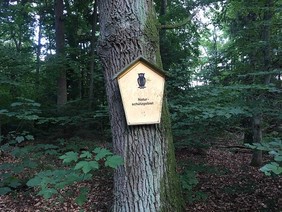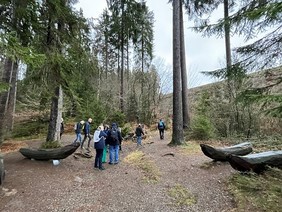The Agency for Renewable Resources (FNR) has started the technical monitoring of 15 new individual and collaborative projects on the communication of forest nature conservation and sustainable forest management. For the eight individual and seven collaborative projects with a total of 26 sub-projects, the Federal Ministry of Food and Agriculture is providing a total funding of around 7.2 million Euros from the "Renewable Resources" funding programme until 2025.
Project partners will examine various conflicting goals - resulting from different societal demands from forests - and develop communication approaches to objectify discussions and generate mutual acceptance. Solutions will also be sought for the communication needs of private forest owners and the changing professional understanding of forestry students.
Forest management vs. recreation: defusing conflicts
In the DeKko4Rest project, experts from the Rottenburg University of Applied Forest Sciences, the Lake Constance Foundation Radolfzell and the Stuttgart Media University are investigating the conflict between recreation and forest management. Based on the results of a nationwide online survey of forest users from the fields of tourism, recreation, forestry and nature conservation, they are selecting frequently occurring conflicts in four forest regions in Germany. In the course of the project, they will also develop communication concepts for these regions using dialogue and participation formats in order to promote empathy for the different uses of the forest. The project results will be made available to the public in the form of four video tutorials and an action guide.
Citizen Participation in Reforestation
As part of the DIAWALD project, scientists at the Technical University of Dresden are investigating not only options for the silvicultural management of disturbed areas in forestry operations, but also possibilities for citizen participation in reforestation campaigns. Together with forestry stakeholders, the project partners are developing scenarios for land development and for the participation of urban and rural user groups. They are also developing target-group and media-specific communication strategies to increase the acceptance of forest restoration activities.
Lay people as virtual forest planners
Under the guidance of experts from the European Forest Institute (EFI) in Bonn and the Forest Research Institute (FVA) in Baden-Württemberg, lay people can virtually plan their own forests. Their joint project, Martelkom, aims to integrate nature conservation objectives into forest management and to objectify the conflict between nature conservation and timber production. Based on silvicultural exercises in digital training areas and a representative survey of the population, the experts are drawing conclusions about the perceptions and evaluation standards of forestry lay people and are developing a well-founded picture of the expectations of different social groups with regard to forests and forestry. They will also develop the Marteloscope method into a tool that can be used by both forestry experts and interested lay people, and derive communication concepts for forestry public relations.
Strengthening public speaking skills of forest owners
The aim of PEFC Germany's "My forest is there for you" campaign is to get forest owners to talk about their own sustainable forest management performance, to fill gaps in the public's knowledge and to respond to media enquiries with high-quality information. In the PEFC_WB_Kampa_2022 project, the association wants to strengthen the reputation of the working methods of sustainable forest owners through a thematically focused information campaign. The project also aims to raise awareness of the concept of forest certification as an independent verification of sustainable forest management and the impact of consumer choices for certified wood and paper products on forest management.
Identifying the conflicting views of the under-30s
Citizens under the age of 30 are the focus of the Millennials_Wald project. The Association for Responsible Forest Management will conduct a representative survey to identify the views of under-30s from urban and rural areas on conflicting objectives in the forest. Interviews and workshops with future practitioners, scientists and company representatives will lead to solutions for target group-oriented communication about modern forestry and recommendations for action for administration, politics and associations.
Background
Climate change and society's expectations of forests are posing growing challenges to sustainable forest management. At the same time, societal debates on conflicts over forest use are intensifying. The launch of the project was preceded by a two-part expert discussion on "Nature Conservation in Forests", which led to a call for proposals on "Communication for Forest Nature Conservation and Sustainable Forest Management". The duration of the approved projects varies between one and three years.
More information about the projects (in German): https://www.fnr.de/fileadmin/news/fnr/2023/PM2023-FNR-015-erweiterteprojektliste.pdf
Contact person:
Fachagentur Nachwachsende Rohstoffe e. V.
Mathias Sauritz
Tel.: +49 3843 6930-148
Mail: m.sauritz(at)fnr.de


